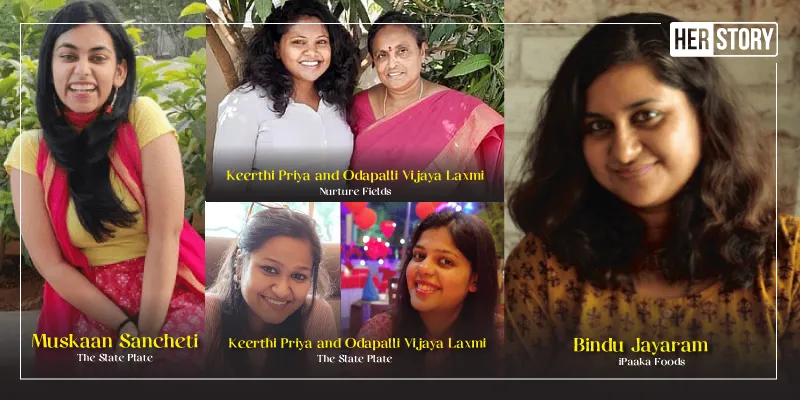Meet these women entrepreneurs who are keeping grub time traditional and tasty
Here are four marketplace and D2C brands found by women entrepreneurs who aim to offer authentic Indian food experiences by saving on time-consuming preparations.
If you’re someone who lives away from home due to higher studies or a job, craving for traditional home-cooked food is real, and so is the struggle to get such a meal. With increasing urbanisation and migration to metro cities, many are now turning to ready-to-cook/eat options.
In fact, the market is expected to reach $647 million by 2023, according to a report by Indulgence.
As more women entrepreneurs tap into the growing opportunity, here is a look at four women-led ventures satiating the food needs of young professionals and students in urban India.

Bindu Jayaram, iPaaka Foods
Bengaluru-based engineer Bindu Jayaram donned the entrepreneur’s hat when in 2018, she founded iPaaka Foods that offers preservative-free and ready-to-cook/eat foods.
Prior to starting up, she had been yearning for quality homemade food and ordering daily meals was not a viable option. However, she used to rely on instant mixes prepared by her mother. It struck her that such a product would be useful for working professionals like her.
After quitting her job in 2016, Bindu and her mother developed tomato dal rasam, idli-sambar, and brinjal curry mix.
With feedback from friends and family who had tried the products, registered its trademark in February 2019 and the production crossed one tonne within six months.
Only having an online presence, the brand says it is receiving a positive response from Tier-I, II, and III cities.
Bootstrapped with an investment of Rs 2 lakh, the startup claims to have grown by 2X every year.
Keerthi Priya and Odapalli Vijaya Laxmi, Nurture Fields
Many farmers lose a major chunk of their produce as post-harvest wastage. Addressing this opportunity is Keerthi Priya, who has pursued BPharm from BITS-Pilani and MBA from IIM Calcutta. She teamed up with her mother, Odapalli Vijaya Laxmi, and founded Telangana-based startup in 2018 with an initial investment of Rs 4 lakh.
The duo works closely with marginal farmers and offers a wide range of dehydrated vegetables and fruits such as mango, sapota (chiku), papaya, spinach, gongura, tomato, cabbage, as well as soup mixes, juice mixes, curry mixes, and FMCG products in ready-to-eat and ready-to-cook categories.
Operating on both B2B and B2C models, the startup caters to customers pan India through a mix of offline and online channels.
Aakanksha Satnalika and Khushbu Malu, JustCook
Pune-based neighbours Aakanksha Satnalika and Khushbu Malu were living busy lives as a fashion designer and chartered accountant, respectively, and found little to no time to prepare and enjoy authentic traditional foods.
While discussing how time-consuming it is to prepare food, and how ready-to-eat meals available in the market are full of preservatives, the duo decided to start , a D2C ready-to-cook brand for authentic Indian foods.
Started in January 2020, they began by iterating idli dosa batter for about 25 rounds in three weeks and finalised a sample that ensured taste, freshness, and a fluffy and soft texture. After getting the lab tests done, they offered it to friends and neighbours to try the product before entering the market.
Operating on dual models of B2B through resellers and B2C, some of its products include Khaman Dhokla Mix, Instant Sambar Mix, and chutneys – all priced between Rs 60 and Rs 150.
The nationwide lockdown that was imposed soon after JustCook became a blessing in disguise as people started experimenting and trying different foods at home.
Running on an initial investment of Rs 5-10 lakh, and Rs 2 million raised from Pune-based angel investors, the startup hopes to raise an additional Rs 20-25 million by next year.
Muskaan Sancheti, The Slate Plate
Entrepreneurship can sometimes be inspired by simple and mundane things. For Muskaan Sancheti, it was her Marwari household running out of papad during the lockdown in May 2020.
While arranging for the same, she realised that the market for authentic, local food products is highly unorganised and does not reach the right audience. She teamed up with her college buddy Raghav Jhawar and founded The Slate Plate in August last year.
An ecommerce marketplace piloting in Bengaluru, it sources authentic and regional food products from various states and delivers pan-India. In less than a year, it has curated more than 500 products and fulfilled over 21,000 orders.
Sellers on the marketplace are not charged any listing fee, however, The Slate Plate earns by gaining the products at discounted prices and selling them at MRP.
Started with an investment of Rs 5,000, it claims a 70 percent month-on-month growth rate.
Edited by Kanishk Singh











